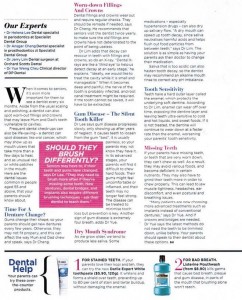 This article first appeared in the January 2013 issue of Simply Her magazine. We have reproduced it for the information of those of you who missed it when it was published.
This article first appeared in the January 2013 issue of Simply Her magazine. We have reproduced it for the information of those of you who missed it when it was published.
When it comes to seniors, it’s even more important for them to see a dentist every six months. Aside from the usual scaling and polishing, a dentist can also spot worn-out fillings and crowns that may leave Mum and Dad’s teeth vulnerable to cavities.
Frequent dental check-ups can also be life-saving – a dentist can spot diseases like oral cancer, which may show up as mouth ulcers that take more than a few days to heal, and as unsual red or white patches in the mouth.
Here are the dental issues common in people aged 55 and above, that your parents should know about.
Time for A Denture Change?
Gums change their shape, so your parents should get new dentures every few years. Otherwise, they may not fit properly, and this can affect the way Mum and Dad chew and speak, says Dr Cheng
Worn-down Fillings and Crowns
Dental fillings and crowns wear out and require regular checks. They should be remade if needed, says Dr Cheng. He recommends that seniors visit the dentist twice yearly, to make sure the old fillings and crowns have not deteriorated to the point of being useless.
Dr Lim adds that decay can reoccur in teeth with fillings and crowns, so do an X-ray, “Dental X-rays are like a ‘third eye’ to help us detect decay at an early stage,” he explains. “Ideally, we would like to treat the cavity while it is small and manageable.” When it becomes deep and painful, the nerve of the tooth is probably infected, and root canal treatment might be required. If the tooth cannot be saved, it will have to be extracted.
Gum Disease – The Silent Tooth Killer
Dr Lee says gums disease progresses slowly, only showing up after years of neglect. It causes teeth to loosen from the gum “bed”. It is usually painless, so your parents may not know they have it. In its advanced stages, your parents will find it difficult to chew hard foods. Their gums might feel uncomfortable or inflamed, and their teeth may no longer feel strong. The disesase can be treated to minimise tooth loss but prevention is key. Another sign of gum disease is extremely foul breath, adds Dr Yue.
Dry Mouth Syndrome
As we grow older, we tend to produce less saliva. Some medications – especially hypertension drugs – can also dry up salivary flow. “A dry mouth can speed up tooth decay, since saliva neutralises harmful acids and helps flush out food particles from between teeth,” says Dr Lim. The solution is as simple as having your parents ask their doctor to change their medication.
Saliva that is too acidic can also hasten tooth decay, so the dentist may recommend an alkaline mouth rinse to correct any pH imbalance.
Tooth Sensitivity
Teeth have a hard outer layer called the enamel, which protects the underlying soft dentine. According to Dr Lim, enamel can wear off overtime, exposing the dentine layer and leaving teeth ultra-sensitive to cold and hot liquids, and sweet foods. If it is not treated, the dentine will continue to wear down at a faster rate than the enamel, worsening your parents’ tooth sensitivity.
Missing Teeth
If your parents have missing teeth, or teeth that are very worn down, they can’t chew as well. As a result, they may avoid various foods, and become deficient in certain nutritients. They may also have to grind their teeth more in order to chew properly. This can lead to jaw muscle tightness, headaches, ear discomfort, and even postural and breathing issues.
“Many patients are now choosing more advanced treatments such as implants instead of conventional dentures,” says Dr Yue. And if crowns and bridges are needed, Dr Yue says that the latest methods do not need the teeth to be trimmed down, unlike before. Your parents should speak to their dentist about these options.
Our Experts
- Dr Helena Lee Dental Specialist in periodontics at Specialist Dental Group
- Dr Ansgar Cheng Dental Specialist in prosthodontics at Specialist Dental Group
- Dr Jerry Lim Dental surgeon at Orchard Scotts Dental
- Dr Yue Weng Cheu Clinical director of DP Dental





